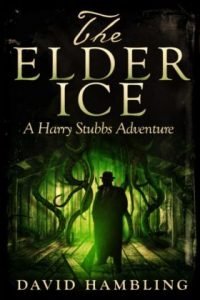The Elder Ice (A Harry Stubbs Adventures) by David Hambling (book review).
I really enjoyed this! As stories go, this was something like a mix between a ‘Call of Cthulhu’ game and an episode of ‘Peaky Blinders’. The protagonist, apparently from a series of books, is one Harry Stubbs, an ex-prize fighter, WW1 veteran, debt collector, and, at the start of the book anyway, an investigator for a firm of solicitors.
With a working-class background and amicable relationships with the local villains, he’s an unusual sort of character to find in a Lovecraftian setting. Stubbs is also an intelligent man, but not in any way steeped in occult knowledge. He is able to handle himself in a fight. But he’s intensely likeable, and the more of the novella that I read, the more I kept thinking about the late Brian Lumley, the prolific British horror and fantasy writer who died earlier this year. ST Joshi, in particular, criticised Lumley for failing to create cosmic horror in the way Lovecraft supposedly intended. Unlike Joshi, Lumley was a massively successful author who sold millions of books, which surely says something about what fiction readers, if perhaps not critics, look for when reading.
One of those things is a tightly written, briskly-paced adventure story, and in my opinion, Hambling definitely echoes Lumley at his best. ‘The Elder Ice’ moves along at a refreshing pace, not so quickly that colorful details are missing, but quick enough to keep the reader turning pages to find out what happens next. Like Lumley, Hambling uses details sparingly, throwing them into paragraphs without ostentation. One such paragraph begins with ‘The Electric was no longer the only establishment on the street to boast electric lighting…’ In a few words, Hambling conjures up the era, where electric lighting was once a novelty but has now become commonplace. With its ambience, it’s easy to imagine a cafe with a modern feel, rather than the Victorian pub Stubbs had visited a few pages earlier.
Where Hambling excels over Lumley is his ability to incorporate real-world historical references alongside the Lovecraftian. The narrative commences with Stubbs investigating the demise of explorer Ernest Shackleton. For many Britons, he’s one of the great heroes and, as Stubbs explains, trumps ‘Scott of the Antarctic’ as being sufficiently skilled a leader to bring his men home safe and sound despite the most terrible odds. Yet Shackleton had a less laudable side, leaving behind thousands of pounds in debts. If not quite a fraudster, he certainly seems to have misled his creditors, though perhaps all in a good cause. Shackleton is also where readers will make connections with ‘At the Mountains of Madness’, Lovecraft’s longest and possibly his best science fiction story. Set several years after Shackleton’s expeditions, ‘The Elder Ice’ naturally features the same lost civilization.
Stubbs investigates Shackleton’s debts and discovers that his expedition to the South Pole brought back something valuable. Initially, he assumed that this was gold, or at least evidence of a potential gold mine. As fate would have it, he finds himself caught between two individuals who have a more accurate understanding of what Shackleton discovered. By the end of the story, I definitely wanted more. Stubbs is a compelling character, and the way Hambling articulates his narration is great fun. It’s Damon Runyon-like at times, with the right sort of argot for a man of his times but knowing, too, pointing the reader towards the meaning of the story.
I miss Lumley and his Lovecraftian adventure stories, but if Harry Stubbs is anything to go by, Hambling is offering himself up as a most acceptable successor.
Neale Monks
July 2024
(pub: Macabre Ink, 2018. 90 page paperback. ISBN: 978-1-94602-558-6)


